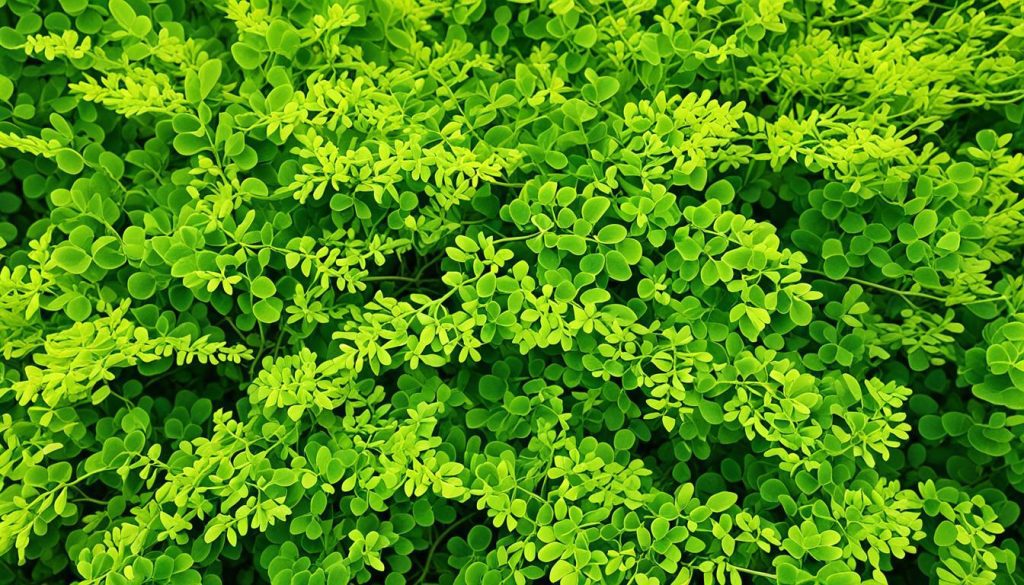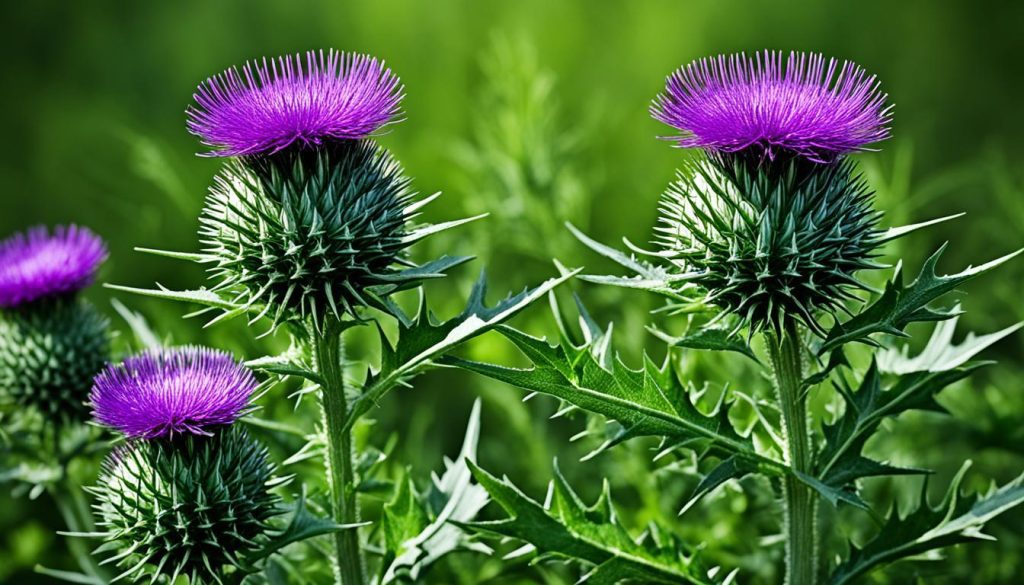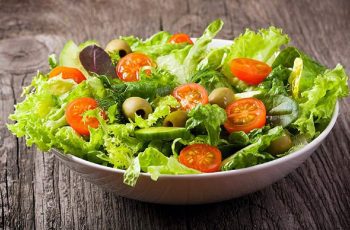Welcome to my blog, where I share valuable information about natural remedies for optimal liver health. As we age, it becomes increasingly important to take care of our liver, as it plays a crucial role in many essential functions of the body. Instead of relying solely on medications, many people are turning to the power of nature to support their liver health. In this article, I will explore the top anti-aging herbs that can benefit your liver and provide natural support for its regeneration.
Anti Aging Herbs for Your Liver
- Anti-aging herbs can be a natural and effective way to support liver health.
- Using herbal remedies can help in detoxifying and supporting liver function.
- Herbs like licorice root, turmeric, milk thistle, ginseng root, and wolfberry have shown promise in promoting liver health and regeneration.
- Consult with a healthcare professional before incorporating any new herbal supplements into your routine.
- Further research is needed to fully understand the efficacy and safety of these herbs.
1. Licorice root
Licorice is a popular herb with a long history of use as traditional medicine for various conditions. Experts point out that licorice root contains glycyrrhizin — a set of compounds that can alleviate liver toxicity.
Notably, licorice can reduce the risk of liver cancer in people with hepatitis C. Researchers suggest that licorice root may be a powerful antioxidative, giving it its liver-protective properties.
2. Phyllanthus amarus
Phyllanthus amarus, commonly known as “gale of the wind” or “stonebreaker,” is a leafy herb found on most continents. This powerful herb has gained attention for its potential benefits to liver health. Clinical trials have demonstrated its significant impact on the treatment of hepatitis B. Experts suggest that Phyllanthus amarus shows promise as a liver-protecting agent and is one of the first candidates for further testing.

With its diverse range of bioactive compounds, Phyllanthus amarus has long been utilized in traditional medicine for various ailments. The herb’s hepatoprotective properties make it an excellent supplement for liver health. Phyllanthus amarus has been found to exhibit antiviral activity against hepatitis B, making it especially beneficial for those with this condition. Additionally, it possesses anti-inflammatory and antioxidant properties that contribute to its protective effects on the liver.
Phyllanthus amarus can be consumed in various forms, including capsules, teas, and extracts. As with any herbal supplement, it is important to consult with a healthcare professional before incorporating Phyllanthus amarus into your routine, especially if you have any underlying medical conditions or are taking medications.
Key Benefits of Phyllanthus amarus:
- Significantly impacts hepatitis B treatment
- Promotes liver health and protects against liver damage
- Exhibits antiviral activity against hepatitis B
- Possesses anti-inflammatory and antioxidant properties
3. Turmeric
Turmeric has recently gained popularity as a natural supplement for various conditions, including anxiety, hyperlipidemia, and arthritis. One of the key components of turmeric is curcumin, which is well-known for its antioxidant and anti-inflammatory properties. These properties make turmeric an ideal choice for improving post-exercise muscle soreness. However, turmeric’s benefits extend beyond muscle recovery.
Curcumin, found in turmeric, has shown promising results in protecting the liver. It can reduce the accumulation of lipids in the liver, improving fat metabolism and minimizing the risk of steatosis. Steatosis is a condition characterized by the excessive accumulation of fat specifically in the liver. By addressing lipid accumulation, curcumin promotes liver health and reduces the risk of steatosis-related complications.
Including turmeric in your diet or taking curcumin supplements may provide a natural way to support liver health and reduce the risk of steatosis. However, it’s always advisable to consult with a healthcare professional before incorporating any new supplements or treatments into your routine.
4. Milk thistle
Milk thistle, also known as silymarin, is a plant native to Europe that’s often used as a supplement for jaundice, diabetes, and indigestion. Some preliminary research suggests that it may also be helpful as a herb for liver health, treating conditions like cirrhosis and hepatitis.
Experts point out that milk thistle works through a specific compound called dihydroquercetin, which could reduce fat buildup in the liver.

5. Ginseng root
Ginseng root is an increasingly popular herb that offers a range of health benefits. One notable advantage is its ability to boost the immune system, improving overall performance and reducing the risk of cancer. This powerful herb is also known for its antioxidant and anti-inflammatory properties, making it effective in treating conditions such as diabetes. However, ginseng root’s benefits extend beyond these areas to include liver health.
The beneficial properties of ginseng root can significantly impact liver diseases like cirrhosis and hepatitis. These conditions can severely affect liver function and lead to complications. Ginseng root’s ability to support liver health can promote better liver function and aid in the management of these conditions.
Furthermore, ginseng root may have additional benefits for individuals undergoing liver surgeries and transplantations. Its immune-boosting properties can enhance the body’s ability to heal and recover from these procedures, promoting successful outcomes.
Overall, ginseng root is a versatile herb that offers multiple advantages for liver health. Its impact on the immune system, combined with its antioxidant and anti-inflammatory properties, make it an excellent addition to a liver health regimen. Whether you are looking to prevent liver diseases like cirrhosis and hepatitis or support recovery after liver surgeries, ginseng root can be a valuable ally in maintaining optimal liver health.
6. Wolfberry
Lycii Fructus, more commonly known as wolfberry, is a fruit that’s often used as a herbal remedy for the eyes and liver. It contains several beneficial compounds, which provide it with anti-aging, antioxidant, and immune-boosting properties. Notably, this berry can severely improve antioxidant activities in your liver, preventing cellular damage caused by liver diseases. Similarly, it has shown promise in preventing liver cancer.
When it comes to liver health, wolfberry offers a natural solution that can support liver function and reduce the risk of liver diseases. Its potent antioxidant activities help protect liver cells from oxidative stress and inflammation, preserving their integrity and function. By enhancing the body’s natural defense mechanisms, wolfberry can contribute to liver detoxification and regeneration.
In addition to its antioxidative properties, wolfberry is rich in essential nutrients and vitamins, including vitamin C, vitamin A, and various B vitamins. These nutrients play a crucial role in supporting overall liver health and function. They promote the production of enzymes involved in detoxification processes and help maintain the liver’s optimal function.
The rich antioxidant content of wolfberry helps combat the harmful effects of free radicals in the liver, reducing the risk of liver diseases such as fatty liver disease and liver cancer. Additionally, its immune-boosting properties strengthen the liver’s defense against infections and other harmful agents.
The Benefits of Wolfberry for Liver Health:
- Provides antioxidative protection for liver cells
- Supports liver detoxification and regeneration
- Reduces the risk of liver diseases
- Enhances overall liver health and function
- Strengthens the liver’s defense against infections
Adding wolfberry to your diet can be a simple and enjoyable way to enhance liver health naturally. You can consume this vibrant fruit as a snack, blend it into smoothies, or incorporate it into various recipes. With its numerous health benefits and delicious taste, wolfberry is a valuable addition to any liver-healthy diet.
Conclusion
There are several natural remedies and herbs that can support liver health and provide anti-aging benefits. Licorice root, Phyllanthus amarus, turmeric, milk thistle, ginseng root, wolfberry, and other liver support herbs offer antioxidative and liver-protective properties that can optimize liver function. These herbs have shown promising results in various studies and have been used traditionally for their liver health benefits.
However, it is important to note that further research is needed to fully understand the efficacy and safety of these herbs for liver function. Consulting with a healthcare professional is crucial before incorporating any new herbal remedies or treatments for liver health. They can provide individualized guidance and ensure that these natural anti-aging herbs are compatible with your specific health conditions and any medications you may be taking.
Prioritizing liver health is essential as the liver plays a crucial role in detoxification and maintaining overall well-being. Alongside incorporating natural remedies such as these herbs for liver detox, it is crucial to follow a healthy lifestyle and practice proper liver care, such as maintaining a balanced diet, staying hydrated, limiting alcohol consumption, and minimizing exposure to toxins. Taking a holistic approach to liver health can contribute to a healthier and more vibrant life.
FAQ
What are the top anti-aging herbs for liver health?
The top anti-aging herbs for liver health include licorice root, Phyllanthus amarus, turmeric, milk thistle, ginseng root, wolfberry, and others. These herbs offer antioxidative and liver-protective properties that can support overall liver function.
How does licorice root benefit liver health?
Licorice root contains “glycyrrhizin,” a set of compounds that can alleviate liver toxicity. It has also been shown to reduce the risk of liver cancer in people with hepatitis C.
What is the potential of Phyllanthus amarus for liver health?
Phyllanthus amarus, also known as “gale of the wind” or “stonebreaker,” shows promise as a liver-protecting agent and can significantly impact hepatitis B treatment.
How can turmeric improve liver health?
Turmeric contains curcumin, which has antioxidant and anti-inflammatory properties. It can reduce lipid accumulation in the liver, minimizing the risk of steatosis.
What are the benefits of milk thistle for the liver?
Milk thistle, also known as “silymarin,” can be helpful in treating conditions like cirrhosis and hepatitis. It works through a specific compound called “dihydroquercetin,” which could reduce fat buildup in the liver.
How does ginseng root support liver health?
Ginseng root is beneficial for treating liver diseases like cirrhosis and hepatitis. Its antioxidant and anti-inflammatory properties can significantly impact liver health. It may also be helpful for liver surgeries and transplantations.
What liver health benefits does wolfberry offer?
Wolfberry, also known as Lycii Fructus, improves antioxidant activities in the liver, preventing cellular damage caused by liver diseases. It has also shown promise in preventing liver cancer.
What are the natural remedies for liver health?
In addition to the mentioned herbs, other natural remedies for liver health include lifestyle changes like maintaining a healthy diet, exercising regularly, and reducing alcohol consumption. It’s also essential to stay hydrated and manage stress levels.
Can these herbs provide anti-aging benefits?
Yes, these herbs offer anti-aging benefits due to their antioxidative properties and their ability to protect the liver from damage, promoting overall health and longevity.




